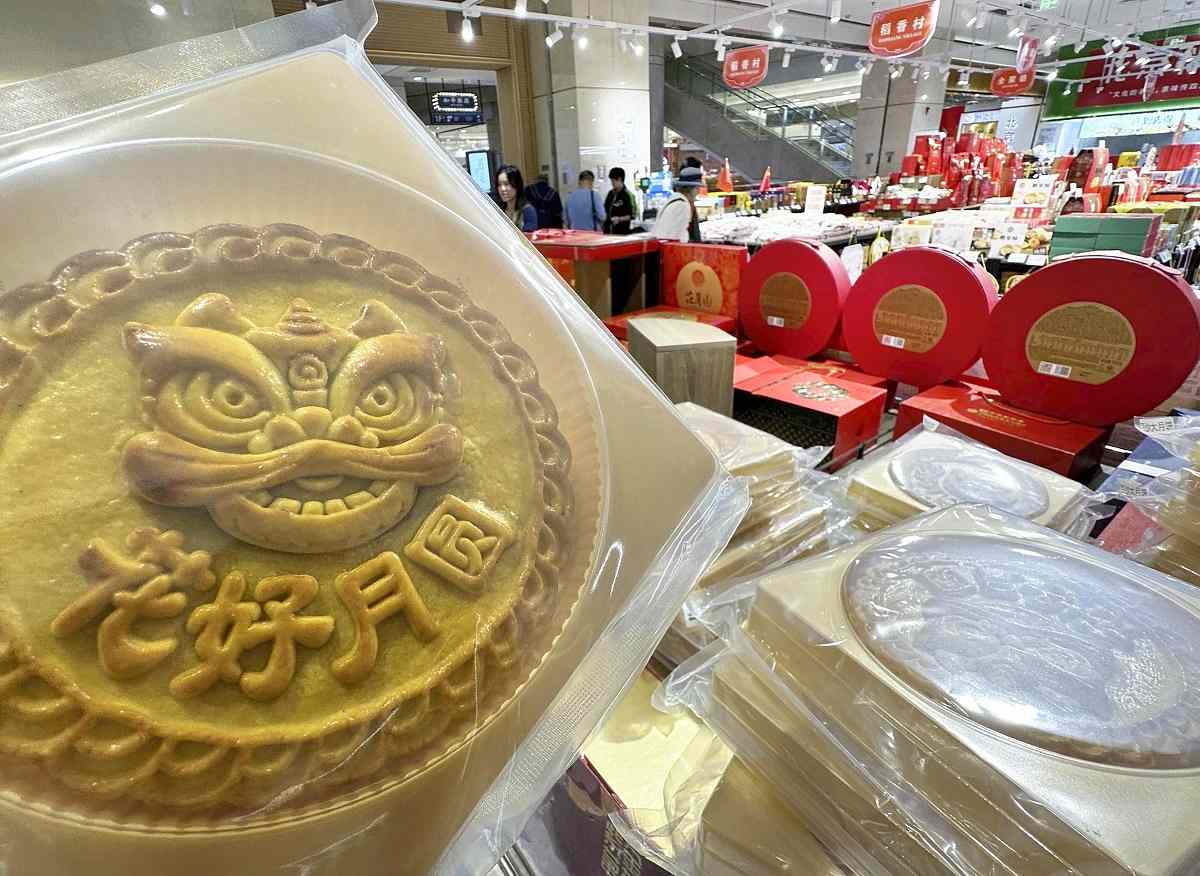Mooncake Sales in China Frosty Ahead of Fall Holidays, as Sluggish Economy and Govt Rules Take Their Toll

Mooncakes are seen for sale at a department store in Beijing on Aug. 30.
12:16 JST, September 15, 2024
BEIJING — Sales of mooncakes, China’s traditional moon-shaped delicacies, are struggling against strong headwinds before the pastry’s peak sales period.
In China, it is customary to eat this sweet on the Mid-Autumn Festival holiday, and mooncakes have long been sold as high-end gifts for the holidays that starts on Sept. 17. The mooncake’s struggle is due to a sweeping anti-corruption crackdown by the Chinese government, which has been tightening rules for expensive gifts.
At one department store in a shopping district in Beijing on Sept. 8, dozens of varieties of mooncakes were on display in bright red and gold boxes at an area specially set up for the sweets. But there were few customers despite it being a weekend.
It is said that 90% of the demand for mooncakes is for gifts, but a female office employee in her 30s said she will buy them only for her home this year.
“Sales of mooncakes are about half of last year’s. Business seems a bit slow,” a female shop assistant said.
One Chinese online media has called this year’s Mid-Autumn Festival “the coldest in history.” According to estimates by a mooncake industry association, most boxes of mooncakes are priced at 70-220 yuan (¥1,400-¥4,400) this year, down from 80-280 yuan last year.
Overall mooncake sales are expected to fall to 20 billion yuan, down nearly 10% from last year. Production is expected to decline to 300,000 tons, down by 20,000 tons.
Consumer appetite has already been dulled by a sluggish economy.
According to a Chinese economic magazine, one hotel in the southern city of Guangzhou set a mooncake sales quota of 20,000 yuan per employee, and a female employee there said she had a nightmare about having to sell the cakes, as she was unable to meet even 10% of her quota despite having bought 1,000 yuan worth of mooncakes herself.
A Japanese-affiliated company in Shanghai, which has been distributing mooncakes to its employees every year, said it opted for 100-yuan products this year, which is 30% cheaper than those it offered in previous years.
The crackdown by the administration of Chinese President Xi Jinping is also compounding the mooncake sales slump.
The Xi administration, which has pledged to eradicate corruption, has targeted the delicacies, associating them with corruption because they once became extremely expensive and came in ultra-luxury versions, including one made with shark fins or swallow nests and another that comes with money or even real estate.
In June 2022, four departments of the central government formulated 12 rules for mooncakes, further tightening restrictions.
Under the rules and other regulations, mooncakes priced at 500 yuan or more are targeted for intensive monitoring, and they should not come in more than four layers of packaging. Packaging costs should also not exceed 15% of the price of the product, and mooncakes must not be sold in a package with other products.
In 2022, the State Administration for Market Regulation, China’s anti-monopoly authority, mobilized 200,000 employees to conduct on-site inspections of more than 30,000 mooncake stores nationwide. Products found to be in violation of the rules and regulations were ordered removed from the stores.
It seems similar measures are being taken in various regions this year.
The Chinese government has been subsidizing expensive items such as cars and home appliances in an effort to stimulate consumer spending, which accounts for 40% of the country’s GDP.
The economy could be further dragged down if the administration comes down hard on mooncakes.
Top Articles in World
-

Israeli Ambassador to Japan Speaks about Japan’s Role in the Reconstruction of Gaza
-

Videos Plagiarized, Reposted with False Subtitles Claiming ‘Ryukyu Belongs to China’; Anti-China False Information Also Posted in Japan
-

North Korea Possibly Launches Ballistic Missile
-

Chinese Embassy in Japan Reiterates Call for Chinese People to Refrain from Traveling to Japan; Call Comes in Wake of ¥400 Mil. Robbery
-

Russia: Visa Required for Visiting Graves in Northern Territories, Lifting of Sanctions Also Necessary
JN ACCESS RANKING
-

Japan PM Takaichi’s Cabinet Resigns en Masse
-

Japan Institute to Use Domestic Commercial Optical Lattice Clock to Set Japan Standard Time
-

Israeli Ambassador to Japan Speaks about Japan’s Role in the Reconstruction of Gaza
-

Man Infected with Measles Reportedly Dined at Restaurant in Tokyo Station
-

Videos Plagiarized, Reposted with False Subtitles Claiming ‘Ryukyu Belongs to China’; Anti-China False Information Also Posted in Japan






















